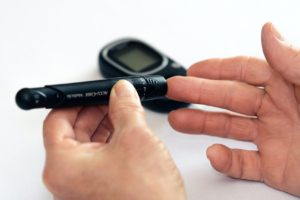Link Between Prediabetes and Sleep Apnea
July 21, 2023
 Obstructive sleep apnea is a common condition that causes frequent breathing disruptions throughout the night. Although it’s easy to diagnose, up to 80% of cases are undiagnosed. Pauses in breathing occur while you’re asleep, so you may not be aware they are occurring. However, a variety of other symptoms can occur, like new health issues. Sleep apnea is linked to several metabolic disorders, including diabetes. Here’s how treating sleep apnea can reverse prediabetes, improve your sleep quality, and boost your overall wellness.
Obstructive sleep apnea is a common condition that causes frequent breathing disruptions throughout the night. Although it’s easy to diagnose, up to 80% of cases are undiagnosed. Pauses in breathing occur while you’re asleep, so you may not be aware they are occurring. However, a variety of other symptoms can occur, like new health issues. Sleep apnea is linked to several metabolic disorders, including diabetes. Here’s how treating sleep apnea can reverse prediabetes, improve your sleep quality, and boost your overall wellness.
Sleep Apnea Affects Overall Health
Obstructive sleep apnea (OSA) is the most common form of the disorder. The soft tissues in the back of the mouth and throat collapse while sleeping, creating an obstruction that can cause pauses in breathing. Each event can potentially last for a minute or more.
Your body is regularly depleted of oxygen and your sleep cycle is interrupted frequently. Poor sleep can affect your mental health and even lead to memory loss. However, repeated stress on your body can increase your risk of several health issues, including heart disease and diabetes.
Many factors contribute to OSA, like being male, having a large neck circumference, or obesity. Being overweight also raises your risk of type 2 diabetes. Untreated sleep apnea raises the odds even higher.
Sleep Apnea and Prediabetes
Sleep apnea starves your body of oxygen, which affects glucose levels and insulin resistance. When your body is deprived of oxygen, carbon dioxide in your bloodstream increases, which can cause higher levels of glucose from insulin resistance. The repeated cycle can progress to diabetes and other related conditions, like high blood pressure.
According to information published in the Journal of Diabetes and Vascular Disease Research, people with pre-diabetes and sleep apnea can manage both conditions by practicing a healthy lifestyle and getting adequate rest.
Healthcare professionals recommend changing poor diet habits and increasing physical activity. You’ll maintain a healthy weight and promote your cardiovascular health. Besides changes to your lifestyle, visit your dentist for sleep apnea therapy.
Treating Obstructive Sleep Apnea
Traditionally, sleep apnea is treated using a CPAP machine. It delivers air through a mask worn over the mouth or nose to prevent a decrease in oxygen. Although it is effective, it can be bothersome, which contributes to a low compliance rate.
Instead, many patients prefer an oral appliance. The custom-fit device holds the tongue and jaw in more comfortable positions to keep the airway open. It’s effective for treating mild-to-moderate obstructive sleep apnea. It can be used alone or along with an oral appliance.
You can lower your risk of type 2 diabetes and the complications associated with sleep apnea by committing to a healthy lifestyle and the right treatment plan. You’ll sleep peacefully knowing you’re on the road to optimal wellness.
About Dr. Byron L. Reintjes
Dr. Reintjes earned his dental degree from the Case Western Reserve University School of Dentistry and has regularly continued his education in many specialties, like orthodontics and sleep apnea. If you need sleep apnea therapy, request an appointment online or call (559) 206-3719.
No Comments
No comments yet.
RSS feed for comments on this post.
Sorry, the comment form is closed at this time.

